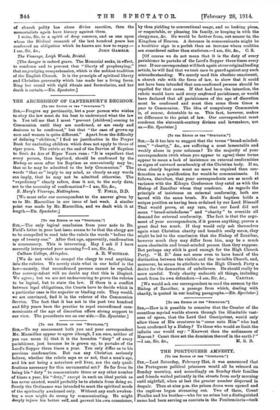[To me EOMIX or ma .erscuma..]
Sra,—Is it too late to suggest that the terms "broad-minded- ness," "charity," &e., are suffering a most lamentable and weekly abuse in your columns ? To the majority of your correspondents (with whom you appear to agree) these terms appear to mean a lack of insistence on external conformities as signs of outward membership of the Christian body. If so, then clearly baptism must no more be required than con- firmation as a qualification for would-be communicants It follows, therefore, that your correspondents are as much at variance with the Kikuyu Conference they extol as with the Bishop of Zanzibar whom they condemn. As regards the principle of insistence on external conformity, both are tarred with the same brush. No doubt baptism holds a unique position as having been ordained by our Lord Himself That would prove, at any rate, that our Lord did not mean " broad-mindedness " and "charity" to override all demand for external conformity. The fact is that the argu- ment of your correspondents, if it proves anything, proves a great deal too much. If they would only ask themselves again what Christian charity and breadth really mean, they might be led to the conclusion that the Bishop of Zanzibar, however much they may differ from him, may be a much more charitable and broad-minded person than they suppose. But perhaps any stick is good enough for the High Church Party. " H. B." does not seem even to have heard of the distinction between the visible and the invisible Church, and, moreover, he seems to attribute to the High Church Party a desire for the damnation of unbelievere. He should really be more careful. Truly charity endureth all things, including
much from its own defenders.—I am, Sir, be., CARITAS. [We would ask our correspondent to read the sermon by the Bishop of Zanzibar, a passage from which, dealing with charity, is quoted in our leading paragraphs.—ED. Spectator.]














































 Previous page
Previous page